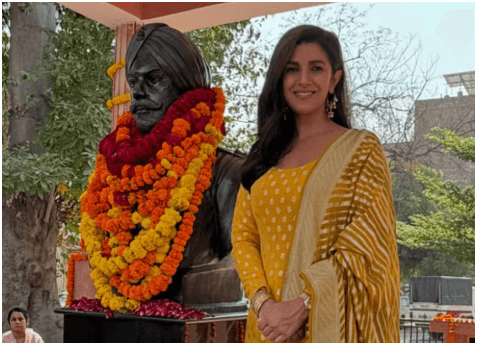Nimrat Kaur’s father, Major Bhupender Singh, was abducted and killed by Hizb-ul-Mujahideen terrorists in KashmirIn January 1994.
Major Singh, an officer in the Indian Army, was stationed in Verinag, Kashmir, where he was kidnapped from his workplace during a family visit. After seven days in captivity, he was killed at the age of 44. The terrorists had made demands for the release of certain individuals, which Major Singh refused to comply with, leading to his execution.
Nimrat Kaur has spoken about the profound impact her father’s death had on her life. She described the sudden transition from an army lifestyle to civilian life as challenging, especially during her formative years. The family moved from Patiala to Noida, and Nimrat continued her education, eventually pursuing a career in acting. Major Singh was posthumously awarded the Shaurya Chakra for his bravery, with the announcement made on Nimrat’s birthday, March 13.
Years later, Nimrat Kaur continues to carry the legacy of her father with pride and resilience, often reflecting on how his courage and sacrifice shaped her worldview and fueled her determination. While the trauma of losing a parent under such brutal circumstances never fully fades, Nimrat has channeled her pain into strength, emerging as a prominent voice for the families of armed forces personnel and victims of terrorism. She has repeatedly emphasized that her father’s values—discipline, patriotism, and integrity—have been guiding forces throughout her personal and professional journey.
Growing up in the shadow of such a profound loss brought with it emotional challenges that Nimrat had to overcome at a young age. She has recalled how, as a teenager, she was suddenly thrust into a new environment, separated from the familiar rhythms of army life and the close-knit military community. Her mother, she has said, was a pillar of strength, ensuring the family remained grounded despite the upheaval. Together, they forged ahead, holding on to the memory of Major Bhupender Singh as both a source of inspiration and emotional anchor.
Nimrat Kaur decision to enter the world of acting was not conventional for someone from a military background, but she has always maintained that her father’s undaunted spirit gave her the courage to dream big. From stage performances to commercials and then major Bollywood and international roles, she carved a niche for herself. Her performances, often marked by emotional depth and quiet strength, echo the resilience she developed in the face of early tragedy.
Over time, Nimrat Kaur began speaking publicly about her father’s death and the circumstances surrounding it—not for sympathy, but to shed light on the sacrifices made by armed forces families and the cruel toll of terrorism. In interviews, she has described how, for many years, she couldn’t even revisit the memories without overwhelming sorrow. But gradually, she realized that honoring her father’s memory meant confronting the past and speaking his truth with dignity.
One of the most poignant moments in her journey was her visit to Verinag, the place where her father last served. Nimrat Kaur described it as a haunting yet deeply cathartic experience. Walking through the same compound, seeing the remnants of army life there, and knowing what had happened left her with a sense of both sorrow and closure. In that visit, she said she could feel her father’s presence and pride, as if he had silently watched her grow into the person he would have wanted her to be.
Nimrat Kaur has often voiced her concern over how easily the sacrifices of soldiers can fade from public memory, lost amid daily headlines and political debates. She believes that beyond medals and posthumous honors, it is critical to humanize their stories and understand the lives that were disrupted—both those of the fallen and the families left behind. Her advocacy underscores the need for national remembrance and collective gratitude that goes beyond ceremonial acknowledgments.
Through her social media and public appearances, Nimrat Kaur continues to celebrate her father’s legacy. On anniversaries and personal milestones, she shares messages or photos, often accompanied by reflections on bravery, loss, and love. Nimrat Kaur has said that every time she steps onto a film set or takes on a challenging role, she feels she is living out the dream her father would have encouraged. In doing so, she hopes to be an example for others dealing with grief, showing that it’s possible to find strength in sorrow.
Her life story resonates with many in India, particularly among the children of service members and those who’ve experienced personal loss due to conflict. It’s not just the tragedy of her father’s death that moves people, but her graceful handling of that trauma—her refusal to be defined by it, and her decision to build a life of purpose and creativity in its wake.
Ultimately, Nimrat Kaur’s journey is one of remembrance and resilience, a story of how the echoes of a single act of terror can be met with decades of quiet strength, purpose, and love. Her father’s courage lives on not only through her words but through every act of compassion, every step of progress, and every role she takes on with honesty and heart. His story, once nearly silenced by violence, now endures in her voice—clear, unwavering, and deeply human.
Stay informed with the latest updates- click here





